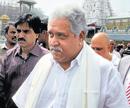
Hyderabad, December 19: Kingfisher Airlines chairman Vijay Mallya may not have enough cash to pay salaries to his employees. But when it comes to appeasing the god, he does not think twice.
On Tuesday, he offered three kg of gold to the Lord Venkateswara temple in Tirumala.
Tirumala Tirupati Devasthanams Deputy Executive Officer (temple) Chinnamgari Ramana said that the Rajya Sabha MP on Tuesday visited Srivari temple on the eve of his 58th birthday with 22 members of his family, including wife, for darshan of Lord Venkateswara during the morning break .
He said that Vijaya Mallya has given 8 kg of gold so far as part of his commitment to give gold for the entire gold plating of the Bangaru Vakili of the Srivari Temple.
With the present contribution Vijay Mallya’s gold contribution touches the mark of 11 kg, he said.
In August, Mallya had offered Rs 80 lakh gold-plated doors to the Kukke Subramanya temple, a place in Karnataka’s Dakshina Kannada district visited by many a well-known personality looking for a turnaround in fortunes. All these notwithstanding, during Diwali, one woman whose husband was employed with Kingfisher Airlines, had committed suicide in News Delhi. Apparently, she was frustrated because her husband has not been given salary from the airlines.
Kingfisher, which Mallya launched in 2005, was once India’s second-largest airline by domestic market share, but is now in deep financial distress. It has been grounded since October 1 following a strike by its pilots and engineers over non-payment of salary dues and its flying licence has been suspended.
It is believed that Mallya made sure that every aircraft he bought, first flew to Tirupati and circled around the Lord Venkateshwara shrine before being deployed.





Comments
Add new comment